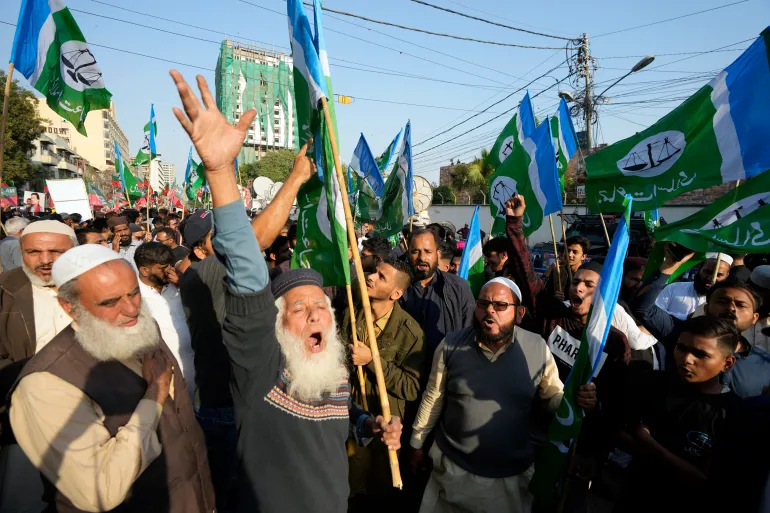On February 8, 2024, Pakistanis voted for their 16th parliamentary election, which many initially speculated would be postponed and, if held, rigged in favour of the Pakistan Muslim League (N). However, the election results brought interesting numbers—none of the parties got the majority. A total of 101 independent candidates, most of whom were supported by the Pakistan Tehreek e Insaf (PTI), have the largest number of seats.
How are we to interpret this fractured mandate? The votes each political party drew reflect that it is essentially against the Army’s political interference, which Imran Khan championed after he was ousted from power. If the past is an indicator, the parties’ lack of majority in the Parliament and formation of a coalition will make the government susceptible to manipulation by the Army.
PDM government II?
Since the independent candidates, despite winning the largest number of seats in the 266 directly elected constituencies, are not organised as a political party, they cannot stake claim to form the government. Out of the independents, 93 were supported by the PTI. The PML-N, which has emerged as the largest party with 75 seats, is short of a majority in Parliament and is in talks with other political parties to form the next government. The Pakistan Peoples Party (PPP) has won 54 seats whereas the Muttahida Qaumi Movement (Pakistan) (MQM-P) has attained 17 seats.
On February 13, six political parties, including PML-N, PPP, PML-Q (Quaid), Istehkam-e-Pakistan Party (IPP), Balochistan Awami Party (BAP), Muttahida Qaumi Movement Pakistan came together to form a coalition government. The consensus candidate for prime minister was Shehbaz Sharif, younger brother of Nawaz Sharif and the outgoing prime minister of Pakistan. Asif Ali Zardari, who was the President of Pakistan from 2008-13, is set to assume the office of presidency again, while Maryam Nawaz will be sworn in as the chief minister of Punjab, the province that determines the political fortune of parties as it is the largest province with the largest number of seats in Pakistan’s National Assembly. While welcoming the PTI to join the coalition, Asif Ali Zardari, who took the lead in this negotiation, said that their “economic and defence agenda should be common”. But interestingly, the PTI in X account captioned this coalition as “mandate thieves”.
After removing Imran Khan from premiership through a no-confidence vote in April 2022, the opposition parties formed a 13-party Pakistan Democratic Movement (PDM) government. This government, led by Prime Minister Shehbaz Sharif, empowered the Army by passing acts like the Army Amendment Bill, the Official Secrets Amendment and the Criminal Law Amendment Bill that prevented criticism of the Army. The Military courts, under which many of Khan’s supporters tried vandalising Army installations and attacking the Corp Commander’s house, were strengthened by Shehbaz Sharif’s government.
The return of Nawaz Sharif to Pakistan and his acquittal from several cases in which he was accused gave rise to the assumption that he was the favoured candidate of the establishment. However, Nawaz has withdrawn from the prime ministerial race and has blessed his younger brother, Shehbaz, to become the premier for the second time. Interestingly, the PML-N has marginally improved its number of seats—it had won 64 seats in the National Assembly in 2018 despite Sharif’s adverse relations with Army, and has won 75 seats this time, when he is touted as a favourite of the Army.
While the PTI campaigned against the Army’s interference in politics and the imprisonment of their leader in corruption cases, the most frivolous case against him was he being sentenced to seven years in prison on the ground of iddat. This also demonstrated that the poster boy of the Army was turned into a villain as serious differences cropped up between him and the establishment over the Army chief’s appointment.
After the conclusion of this election, where the PTI could not fight on its election symbol of Bat, his supporters continued to harp on rigging. They happily accepted the blatant electoral support that the Army extended to them earlier, which resulted in the Party increasing its seats from 27 in 2013 to 115 in 2018. In April 2018, Sharif was disqualified from contesting the election as per the provision of 62(1)(f) to facilitate Khan’s victory. This ban for life was lifted by the Supreme Court prior to the 2024 election as the court said that the ban cannot be more than five years and is against fundamental rights to contest election.
The PTI’s narrative since 2013 has been that their votes were stolen. In fact, many of the demonstrations organised by the PTI at that time revolved around this issue, which led to the setting up of the Judicial Commission, whose findings rejected Khan’s claims. They are trying to bring back the same narrative now to argue that it is the Army that has manipulated the election to deny the PTI majority in the Parliament by stealing votes. There is no denying the fact that despite all odds, Khan still retains popularity compared to the PML-N and PPP.
The party that almost lost popularity in 2021-22 in the face of a rising economic crisis has persisted, as Imran remained adamant on his stance not to approach the IMF. He turned the table on his detractors when he attributed his loss of majority in Parliament to Western conspiracy. He criticised his benefactors for interfering in politics and being above the law. He also accused the Army of being petrified of his popularity and, therefore, arresting him.
Advantage Army?
Social media is rife with the assumption that the Army could not manage the election as the PTI-backed independents, popularly known as Azad, won many seats. However, several reports in the print media allege irregularity in the election even as the establishment calls for politicians to show maturity and unity.
A fractured mandate has always given the Army the space to call the shots. After the 2008 transition to democracy, the PPP and the PML-N as political parties retained power in the Centre even though their prime ministers were removed through judicial verdicts. The PTI, which formed a coalition government stitched by the military with the support of other parties, could not last the five-year term as the Judiciary opened in the middle of the night to ensure that Khan stands for a floor test to prove his majority in the house which he failed.
The Army’s ability to play one party against another is well known. It empowered the PTI as both the PPP and the PML-N were critical of the Army and its interference. Nawaz Sharif filed a treason case against General Musharraf, which he later admitted as one of the causes for his conviction in the Panama Paper corruption case and subsequent disqualification. In most of these cases, the Supreme Court of Pakistan did not hesitate to do the bidding on behalf of the Army. Part of its judgement stemmed from the judicial activism under former Chief Justice Iftekhar Chowdhury, and partly, it was dictated by the expediency of the situation.
Source: Here

